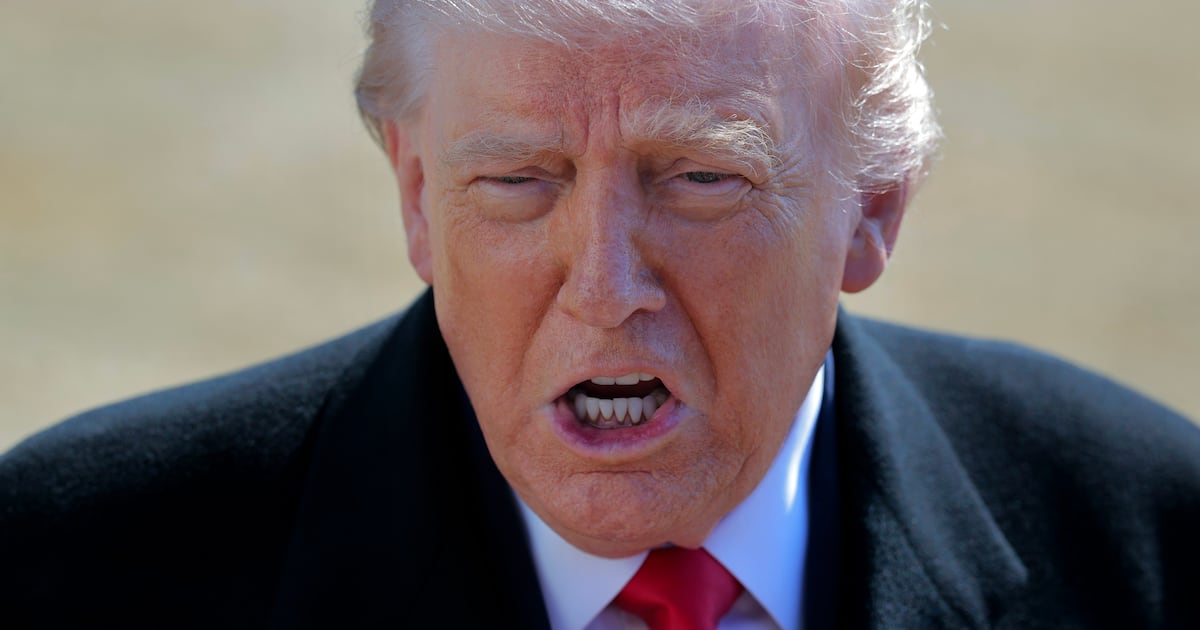At this very moment, political journalists all over the country are searching theasurus.com for synonyms for “decisive.” Good luck to them.
After all, there are only so many ways to describe the results of South Carolina’s GOP primary on Saturday. The votes haven’t been fully counted as of this writing, but all indications suggest a humiliating margin of victory for Donald Trump over Nikki Haley, who mounted a last stand in the state she governed—to mixed reviews—for six years.
“Massive SC landslide for Trump,” University of Virginia political scientist Larry Sabato wrote in a social media post, predicting that the results would be so obvious, and so skewed, that the race would take no time to call.
He was right. Trump has never been stronger, at least among the GOP electorate. No thesaurus could do justice to the hold Trump has over the Republican Party: in Iowa, in South Carolina, in Washington, D.C.
Even though Haley has vowed to soldier on, her campaign is going to end on or around March 5, when 15 states hold their primaries on what is known as Super Tuesday. It will not implode as did the disastrous presidential bid of Florida Gov. Ron DeSantis, but that is small consolation for a woman who emerged from the GOP’s primary scrum looking convincingly presidential.
Haley polls magnificently well against Biden, and while one could easily envision her hitting the president with a devastating haymaker during a debate, or outworking him on the campaign trail, she’s ultimately going to lose in the primary to a guy who barely campaigned for the nomination. “You go to war with the army you have,” former Defense Secretary Donald Rumsfeld once said. And so the Republicans will go to war with Trump.
And many are happy to do so. Somehow, he is now doing better with Black voters than he did in 2020, according to a Howard University poll. And a recent Emerson College poll showed him beating Biden among Hispanic voters.

A scene from Trump’s South Carolina victory party.
Win McNamee / Getty“Every day, it becomes more likely that Trump is not just the nominee but is elected president,” Republican pollster Frank Luntz said in a recent Forbes interview.
But even as he celebrates his win in South Carolina, Trump has—in many ways—never been weaker.
The weakness has nothing to do with his political support, which remains as solid as the granite of New Hampshire (a state where Haley was thought to have a chance, only to lose to Trump by 11 percent); rather, what’s causing Trump trouble is the 91 indictments, across several civil and criminal cases, that could impoverish and imprison him.
The runup to South Carolina has been a perfect illustration of Trump’s bifurcated reality. Depending on whom you ask, he is either in the best position of his political career or about to see that same career implode as spectacularly as it began nine years ago, with that famous escalator ride.
The romp in South Carolina comes a little more than a week after Judge Arthur Engoron ordered Trump to pay $454 million in a New York fraud case—brought by the state’s Attorney General Letitia James—that alleged he grossly inflated the value of his properties. And in January, he was ordered by another judge in another civil case to pay $83 million to E. Jean Carroll, a writer who alleged that he raped her in the 1980s.
Trump’s attorneys are fighting both rulings, and they may succeed in at least delaying final dispensations until (they hope) he is back in the White House and legal matters become infinitely more complex. But the fight isn’t free, and Trump has devoted millions of dollars from his campaign funds to his legal troubles, which include not only the two civil judgements in New York, but also two federal cases brought by special counsel Jack Smith, as well as an electoral fraud case in Georgia.
Oh, and don’t forget Manhattan District Attorney Alvin Bragg, who charged Trump last year with financial improprieties related to a hush money payment he made to a porn star. That trial is set to begin on March 25. Meanwhile, Smith is also pushing for a speedy trial.
In 2020, Trump mocked Biden for running his campaign from a basement. This time around, Trump might run his campaign from a courthouse.
But it would be delusional to think that legal troubles have Trump on the ropes. The South Carolina results should not be dismissed as simply a gratuitous MAGA flex. Trump is especially dangerous because Biden is in such perilous electoral territory.
At this same moment in the 2012 election cycle, Barack Obama had a 45 percent approval rating. Biden hasn’t been at 45 percent since April 2022, according to Reuters. He is now as underwater as the Titanic, with a widening 38-57 percent approval-disapproval differential.

South Carolina Gov. Henry McMaster, Donald Trump, and Lt. Gov. Pamela Evette stand on stage during an election night watch party on Feb. 24, 2024.
Win McNamee / GettyConcerns about Biden’s age are becoming more and more pronounced at the worst possible time, since the months to come will see the campaign enter its most intense stage. Every gaffe (as when he called Russian dissident Alexei Navalny’s widow, whose name is Yulia, “Yolanda”) will reinforce the image of “a sympathetic, well-meaning, elderly man with a poor memory.” Those are the infamous words of special counsel Robert K. Hur, a devastating aside in an otherwise exculpatory report on the president’s handling of classified documents.
Biden’s support for Israel has proven unpalatable to many younger voters, not to mention the large Arab-American constituency in the swing state of Michigan, with Rep. Rashida Tlaib, who is Palestinian-American, urging Democrats to vote “uncommitted” in next week’s primary. Biden will obviously win, but Tlaib could still manage to humiliate him. In some ways, she already has.
Biden can’t even get credit for the economy: His raft of investments, known collectively as “Bidenomics,” has been a “political failure,” New York Times columnist David Brooks recently put it.
His Times colleague Ezra Klein went even further, arguing that Biden should forgo his re-election campaign. To make matters worse, Vice President Kamala Harris is even less popular than Biden. No matter how you look at it, the Democrats are stuck.
Republicans, meanwhile, are sticking by Trump. South Carolina exit polls showed that 65 percent of voters agree with Trump’s false claims that he won the 2020 election. And only 13 percent said what mattered most to them was an ability to beat Biden—the trait Haley’s supporters most often tout. More than one-third of respondents (37 percent) said they were looking for a candidate who “fights for people like me.” In other words, Trump.
The nomination is effectively Trump’s. South Carolina has been a reminder of that fact. He is spoiling for a fight with Biden. “I just wish we could do it quicker,” he said on Saturday night of the general election, still many months away.
Yet the courtroom proceedings in New York and elsewhere offer another angle from which to regard Trump, a cautionary corrective to his primary romps. We’ve never had a presidential candidate so wounded and invincible at the same time, so plausibly poised for both victory and defeat.









